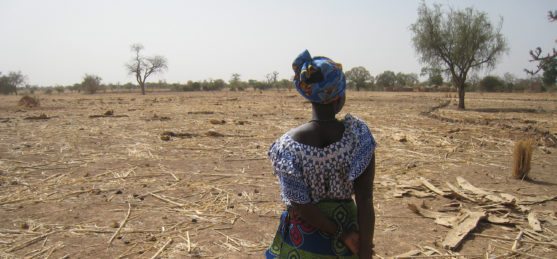By Marian Amissah-Ocran
First, Maame Kraba was diagnosed with HIV. Shortly thereafter, her husband died of the disease. For Maame, a young mother of two children living in Western Region, Ghana, her husband’s death marked an abrupt change in her family’s circumstances, one that would put her rights to land in jeopardy.
Though Maame had shared a parcel of land with her husband, her name wasn’t listed on the family’s land title. The couple had been in a customary marriage, and traditional norms for inheritance meant she had no rights to inherit land held in her husband’s name. Her in-laws seized control of the couple’s land, preventing Maame’s access and use.
The social stigma that came with her HIV diagnosis left Maame estranged from her husband’s family; they would ultimately force her out of the home and separate her from her children. Without secure land rights, Maame found herself without a home, shelter or family.
Maame had lost access to her most valuable asset – a major source of employment and a key ingredient for social and economic empowerment. For rural women, secure rights to land can grow incomes, improve household food security, and contribute to improved health and educational outcomes for families. The reverse is also true: Research suggests a lack of land rights can exacerbate gender inequalities that contribute to HIV risk factors for women. On World AIDS Day, it’s important to remember that secure land rights can bolster HIV prevention and provide stability for the estimated 14 million women in sub-Saharan Africa who are living with the disease.
But in more than half the world, women like Maame face barriers to their access, use of and control over land, whether by inadequate legal protections at the national and local levels or discriminatory social practices within communities.
In few places is the gender gap in land as pronounced as in sub-Saharan Africa, where 70 percent of the population earns a living through agriculture, yet on average women account for just 15 percent of all landholders. This is in part a result of customary land tenure systems that often exclude women from ownership or control of land. Without secure land rights, women are more likely to be displaced by family members, as happened to Maame, or by other kinds of dispossession without due compensation, ranging from divorce to large-scale land acquisitions. They are often excluded from decisions and negotiations over land altogether.
Even where legislation upholds women’s right to inheritance, customary law may at times restrict a woman’s right to inherit land, leaving her vulnerable to dispossession through divorce or widowhood. Women with disabilities are more likely to be denied their inheritance, contributing to higher rates of poverty. HIV infection, which disproportionately impacts women in sub-Saharan Africa, further subjects them to being victimized by property-grabbing relatives.
Though these challenges seem daunting, stronger rights to land and productive resources can erode gender inequalities and help reverse negative trends. Research shows that stronger land rights for women can increase crop yields and improve household food security, encourage soil conservation and other sustainable farming practices, and build climate change resilience.
Recognizing the need to close the gender gap in land and resource rights, advocates for women’s land rights on the continent have utilized proactive interventions to influence land-related laws and policies in various countries.
In Rwanda, the 2005 Land Law formally abolished traditional customary law and guaranteed that women can inherit property from fathers and husbands. The Communal Land Law in Kenya and the Land Act in Malawi, most recently enacted, recognize women’s land rights. Courts across the continent have upheld women’s equal rights to inherit and control land.
But while African governments have begun a trend of passing progressive laws and policies on women’s rights to land and productive resources, for rural women, these reforms too often disintegrate when they collide with discriminatory local norms and practices.
For Maame and millions of other women living with HIV in Africa, ignorance of land, property and inheritance laws at the national level ensures that customary inheritance practice continue to rule supreme. To reverse this trend, national and local projects need to integrate legal literacy on land, property and inheritance rights for women and girls in Africa.
Women’s land rights practitioners on the ground have and can work to bridge the gap between policy reform and implementation. To better facilitate the exchange of information and best practices, organizations like the Landesa Center for Women’s Land Rights are bolstering networks of women’s land rights professionals.
A stronger network of women’s land rights advocates would provide a platform to build synergies, gather resources and collective laws to protect women’s land rights on the continent. By operating at the national and local levels, these networks can encourage governments to adopt pro-poor and gender-responsive land laws while ensuring these laws work for the women (and men) who stand to benefit.
Marian Amissah-Ocran is a gender and land consultant for Landesa, based in Accra, Ghana. She is a member of the 2016 cohort of the Landesa Center for Women’s Land Rights’ Visiting Professionals Program, which aims to strengthen women’s land rights through the development of global networks of professionals and organizations collaborating on women’s land rights.
This post originally appeared on News Deeply.

